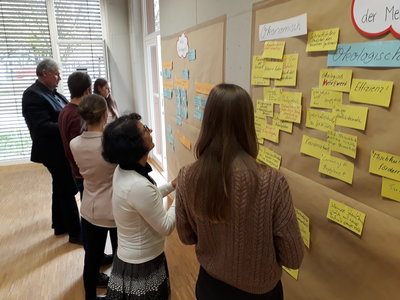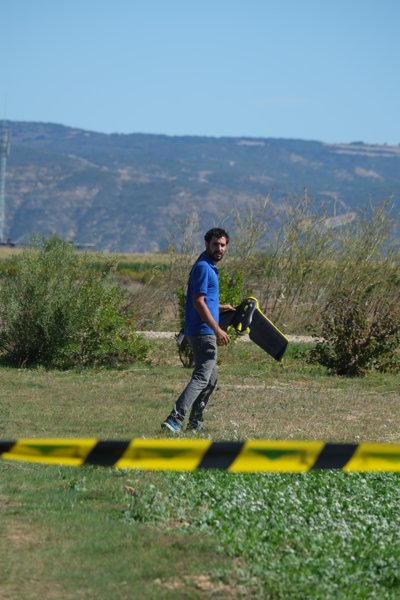Are farmers ready for Smart Farming? What are the barriers for Smart Farming adoption? How about the incentives and facilitators? Which transfer strategies are more successful? Smart AKIS Network has been working on these questions in the last 2 years and come up with some learnings.
Why Smart Farming?
As a response to the global food challenge of feeding more than 9 billion people in 2050 and to strengthen the sustainability and competitiveness of the European agricultural sector. This underlines the need of a wider adoption of Smart Farming, allowing for a more sustainable, resource efficient, and productive EU agriculture.
However, a number of technological, social, regulatory and economic factors have hindered the widespread adoption of these innovations, both in large as well as small and medium scale farms.
Smart AKIS Network
Smart AKIS is the thematic network focusing on the dissemination of Smart Farming Technologies (SFT) in Europe, backed up by EIP-AGRI and funded by the Horizon 2020 programme.
To that end, Smart AKIS has developed a Smart Farming Platform. An online and open database with more than 1.200 Smart Farming solutions available for farmers. 
Besides, in order to get insights about farmers’ perception about Smart Farming, over 270 farmers have been interviewed and more than 700 farmers, researchers, advisors and industry players have been engaged in 14 Innovation Workshops where questions about barriers, needs, interests and successful approaches were addressed.
Farmers’ demands for Smart Farming adoption
During this time, Smart AKIS has come up with the following learnings that can be helpful for practitioners and policy-makers when defining new policies, and programmes, such as the new Common Agricultural Policy (CAP).
- Access to Finance
Access to finance remains a barrier for the widespread adoption of SFT. Available sources of funding should be made easy to understand and to apply for farmers looking for synergies among available funds. In many cases, farmers feel overwhelmed by the existing offer of SFT and feel insecure due to the pace of innovations leading to technological obsolescence, which limits their investments in SFT. In this field, unions, associations or CUMAs (Coopérative d'utilisation de matériel agricole, French model of cooperatives for shared agricultural equipment) might play a facilitating role for the development of new business models following social innovation drives.
- Impartial Advice
Farmers need to gain confidence on SFT capabilities and stakeholders. Thus, they request impartial, non-commercial, and independent expert advice accompanying their purchase decision, equipment set-up, quality, and conformity. This expert advice could come from platforms, advisory services, and industry while being based on “ground truth evaluation” alongside objective, and provable data.
- Demonstration
Demonstrations are a key factor for adoption. Farmers would welcome neutral demonstrations of SFT solutions with a broad range of use-cases covering a variety of soils and crops. Furthermore, at farm level, demonstrations showcase good practices related to the use of SFT. Applied research can play an important role in the evaluation of SFT, providing empirical evidence of cost-benefit and other advantages in terms of yield, comfortability and efficient use of intrants, like the ones implemented in IoF2020 large scale demonstration project.
- Collaboration
Peer-to-peer collaboration, support between early adopters and followers, and the facilitator role of advisors are successful strategies to foster SFT adoption. Participation of start-ups, applied research institutes, and the industry on multi-actor efforts like operational groups can contribute to the adaptation of available technologies to farmers’ real needs. 
- Plug & Play
Plug & Play approaches are highly demanded by users of new technology setups, the upgrade of existing equipment, improved technology usability and data interpretation. A combination of tools – such as training podcasts, infographics, the use of digital screens, or short video clips - should be made available by the agricultural industry and advisory services to educate users.. Moreover, the user experience (UX) should be improved in the design and development of new equipment and programmes.
- Interoperability and Standardisation
Interoperability and Standardisation remain a challenge in spite of industry’s efforts to progress in this field. Farmers demand compatibility among SFT in order to maintain the flexibility in their processes and spread risks through using different SFTs from various providers. Nevertheless, farmers are also waiting for integrated systems delivered by a single provider tackling all their farm management and data support needs.
- Data Management Concerns
Data management concerns farmers in terms of data ownership, exploitation and usability. Upcoming regulation enshrining ownership of agronomical data by farmers, will demand a wide dissemination and increased visibility of the current benefits of sharing such data, mainly for small farm holders.
Smart AKIS keeps working with farmers, researchers, advisors, and industry to come up with policy recommendations in 2018 on how to tackle these and other challenges for Smart Farming to become the New Normal in EU agriculture.
All images are copyright property of Smart AKIS:
- Work Group in Smart AKIS Workshop in Germany.
- Drone in Field Visit in Smart AKIS Workshop in Spain.
Additional material: Smart AKIS brochure.
